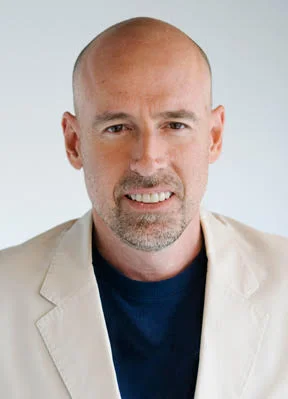Marketing renegade Scott Galloway on digital strategy, brand ethics, and why partnering with Amazon is a really bad idea
Scott Galloway and his company L2 predicted Amazon would buy Whole Foods ages before any whispers of the acquisition. (If you’re looking for digital strategy and competitive deep-dive analysis to grab that edge over your competitors, look no further than L2.) He also has served on the board of directors for retail giants like Urban Outfitters and Eddie Bauer. As professor of marketing at the NYU Stern School of Business, Scott mentors and guides students on how to thrive in today’s rapidly-changing marketing landscape. Each one of his talents is impressive and worthy of accolades, but it wasn’t until we read his NY Times bestseller, The Four: The Hidden DNA of Apple, Amazon, Facebook, and Google, that we realized he’s a total badass. The book is nothing short of an eye opener, calling out the monolithic tech giants for their monopoly on our wallets and our minds, while also highlighting the fact that most of us—knowingly or unknowingly—are complicit. We were beyond excited to chat with this real-life renegade about Amazon’s imminent dominance, the recent popularity of hyperbole in marketing, and the one thing he’d say to Bezos or Zuckerberg if he ever met them face to face.
“A brand’s marketing is only as good as its product.”
1.
You’ve hinted that one of the Four, Amazon, is possibly on the verge of dominating the other three. Is there a snackable way to explain how this could be achieved?
Scott Galloway: Typically, it was the Four (Amazon, Apple, Facebook, and Google) going after befuddled prey in different sectors, sucking market cap from old economy firms. However, one of them is starting to not only go after prey in different sectors, but is going after the other three. When you think about where the Four overlap, in almost every case, Amazon is winning. Apple is thought of as the most innovative hardware company in the history of business. But in the last few years, is it the Apple Watch or the Apple Pods that has been the most impressive hardware innovation? No. It is Amazon’s Alexa. If someone had told you a few years ago that voice would be as important as it is today, what company would you have guessed would be the leader in voice recognition technology? I think most people would have guessed Apple first, and then probably Google. But it’s actually Amazon, who now controls over 70% market share in voice. In digital marketing, it’s been the story of Facebook and Google; however, I think we’re going to see (especially following the Russian and Cambridge Analytica Scandals) that Amazon is going to start to eat into the Facebook/Google duopoly.
Amazon’s core competence is not operations, the cloud, or even technology, but storytelling. Jeff Bezos’ ability to paint an extraordinary vision (“Earth’s Biggest Store”) and register steady progress against that vision is rewarded with the cheapest capital in the history of business, allowing them to try ten innovations for every one of their competition. They effectively run their business at break-even. As long as they can take all of that money and plow it back into the company, then what’s the point of being profitable? Continued reinvestment in the company allows Amazon to expand its capabilities and ward off competitors.
2.
Conventional marketing for brands—and the advertising industrial complex—are crashing as fast as Amazon grows. Do you think it’s worth it for brands to partner with Amazon to get their brand DNA through to the customer? Is it even possible to cut through?
SG: Amazon partners with brands like a parasite partners with a host. In general, the most powerful, best-performing firms make terrible partners. Why? Because they don’t need you. ToysRUs, Circuit City, and Borders (all early partners with Amazon) outsourced their ecommerce to the platform…and where are they now? They’re all bankrupt. The Amazon environment is an extremely competitive one that forces brands to offer aggressive couponing and discounts. Between 2016 and 2017 the top ten best-selling Personal Care products on Amazon each saw a decline in their average price from 14% to 77%. Not to mention, Amazon’s push into private label ensures their algorithms favor their own products over the competition.
However, to win as a brand today, you need to have some sort of an Amazon strategy. Calvin Klein, for example, recently began selling certain items exclusively on the e-tailer, focusing on selective, high-volume, low-cost products, and core replenishment categories such as underwear. This helped their parent company PVH achieve a 20% digital revenue growth in the third quarter of 2016. That being said, brands will never be able to acquire customers at a lower price than Amazon. The first thing I tell boards when asked how to compete with the e-tailer is that, unfortunately, you’ll need to lower your profit expectations and should re-invest more in the consumer experience.
3.
Speaking of the slow death of conventional marketing, what does that mean for the creative class? How would you advise your marketing students to get creative about their job prospects (other than apply at the Four)?
SG: Five to seven years ago, the number one recruiter of my students at Stern was American Express. Hands down, the number one recruiter at Stern today is Amazon. Kids come into my office, and nobody ever wants to talk brand strategy or digital marketing, they just want to talk about their careers. They’ll tell me they have an offer from Macy’s, an offer from this great company in their hometown, and they have offer from Amazon. I let them go through their options, but effectively, we both know that they are going to Seattle. It’s the most respected training ground: there’s no company in the world that calls you for an interview and isn’t interested in the skills sets you’ve gained working for Amazon for five years. The same can be said for the other Four. There are always other options, but Amazon, Apple, Facebook, and Google attract the top talent, and if you want to work in digital marketing, it’s where you ought to be.
4.
There’s a trend in digital marketing of using hyperbole to get clicks and generate leads (ex: Best. Sheets. Ever.). What’s your take on this style of branding? When you’re up against Amazon, smaller brands need to be scrappy, no?
SG: A brand’s marketing is only as good as its product. You can claim to have the “Best. Sheets. Ever.” but if the product doesn’t meet the consumers satisfaction then they won’t be back to purchase again, they won’t recommend you to a friend, or worse, they will write a negative review on your product page.
“I think that big tech companies, especially Facebook, need to understand that we are really disappointed in them.”
5.
You’re a renegade in the pursuit of truth and transparency about the Four. If you were to consult with Jeff Bezos or Mark Zuckerberg, what’s the one thing you’d say to them for your message to cut through?
SG: I think that big tech companies, especially Facebook, need to understand that we are really disappointed in them. We have come to expect that technology plays a larger role in the betterment of humanity and you can understand why. In the 1940s, 100,000 of the best and brightest decided to get together and to try to save the world by entering into a foot race to split the atom first. The same thing happened 25 years later, when 400,000 British, Canadian, American and German Scientists worked together with the technological equivalent of chalk, chalk boards, and abacuses, to put a man on the moon. And now? We have 700,000 of the world’s elite talent employed by big tech companies who are effectively working with lasers, compared to the metaphorical slingshots and squirt guns of the NASA and Manhattan project. And what have they been brought together to do? After ten years of working with and studying these companies I can tell you that their collective goal is to sell another Nissan. We have the greatest concentration of human, financial, and creative capital and they show little regard for their effect on the market; making the world a better place; or, most importantly, for the well-being and safety of their users.
A few quickies:
Words of advice: There are people who are successful professionally while managing a food blog, volunteering at the animal shelter, and mastering ballroom dance. Assume you are not one of those people. Balance, in my view, is largely a myth when establishing your career.
Last show you binge watched: Modern Family
Favorite destination to unwind and unplug: At home with my boys
Last book you were inspired by: Sapiens: A Brief History of Humankind by Yuval Noah Harari
No time to read Scott’s book? Read this.
Scott’s take on the recent Facebook drama.
Future tech moguls: read these books first.
Speaking of the moon landing, this is really cool.
NEXT UP: RUTH ROGERS





